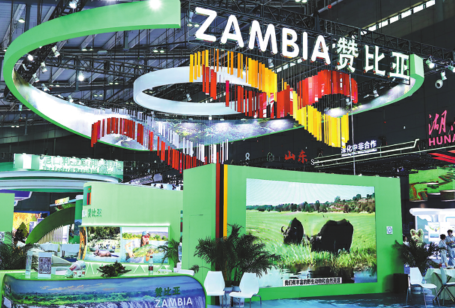Two-way trade boosts economy
China-Zambia cooperation stays true to pursuing high-quality development and has boosted both the quality and quantity of two-way trade and investment, said government officials and business executives.
They added that growing cooperation between the two sides has created a conducive environment for businesses to expand operations, creating jobs, fostering fresh growth areas and enlarging the scale of exports and imports.
China and Zambia saw their trade value surge 30.2 percent year-on-year to $6.73 billion in 2022, data from China's General Administration of Customs showed.
China exports mainly electrical appliances, boiler and telecommunication equipment, trucks, trains, chemical goods, medical equipment, and plastic and rubber products to Zambia. In addition to copper and cobalt, Zambia's shipments to China include sugar, corn, cotton, tobacco, precious stones, timber and textiles.
To bolster Zambia's exports to China, the two countries signed protocols for the export of stevia and soybean meal to China in 2022. The implementation of China's zero-tariff treatment for 98 percent of Zambia's taxable exports to China has also contributed to this.
Grace Njapau, director of Kakanga Food Suppliers in Zambia, and a participant in the third China-Africa Economic and Trade Expo in Changsha, the capital of Hunan province, which took place from June 29 to July 2, said that trade exchanges between China and Zambia, which are highly complementary and mutually beneficial, underpin the economic and social development of both sides and deliver benefits to their consumers.
"Every time we come to China, we discover new business opportunities. The Chinese market is a land of opportunity, and we are also willing to bring higher quality African goods to China," said Njapau, who has been doing business with her Chinese partners since 2001.
Over the past two decades, Njapau said that she has witnessed and experienced the progress of China-Africa economic cooperation toward prosperity.
In addition to holding large-scale trade fairs, including the China-Africa Economic and Trade Expo and China Import and Export Fair, or Canton Fair, China has been exploring more channels such as mobilizing trade promotion groups, harnessing e-commerce platforms and launching online shopping activities to bring more high-quality products from both Zambia and other parts of Africa to its market, said Wang Xueling, a researcher specializing in regional economic development at the University of International Business and Economics in Beijing.
The success of China's modernization exemplifies the diversity of modernization models worldwide. China's ongoing journey of high-quality development and modernization will also continue to offer fresh opportunities to many African countries like Zambia, Ethiopia and Ghana, said Wang.
Benefiting from their closer business ties and political trust, Zambia commissioned a project financed by China aimed at improving water supply and sanitation in Lusaka, the Zambian capital.
The $150 million phase-one Kafue Bulk Water Supply Project financed by the Export-Import Bank of China and constructed by China Civil Engineering Construction Corp, a subsidiary of State-owned China Railway Construction Corp, is to ensure that about 500,000 people in the Zambian capital have access to clean and safe water as well as proper sanitation.
It involves the construction of an intake structure, treatment plant, booster station and transmission lines to deliver a total of 50,000 cubic meters of water per day.
Chinese Ambassador to Zambia Du Xiaohui, said that the completion of this project will go a long way in improving access to safe and clean drinking water for residents of the Zambian capital. He emphasized that the project was designed to address the original water supply system's inability to meet the growing demand for water in the capital.
The Chinese diplomat said that the water supply capacity of the project will provide people in the capital with sufficient, healthy and clean water, and it has contributed to the creation of local employment and enhanced capacity building.
"Nearly 1,000 local people were employed and trained at the peak of the construction of the project," said Du.
Zhou Xiaoyan, vice-president of the Beijing-based China Council for International Investment Promotion, said by leveraging their respective strengths and resources, China and African countries can foster greater integration in key sectors like manufacturing, agriculture, infrastructure and technology.

The Zambian booth at the third China-Africa Economic and Trade Expo in Changsha, Hunan province, in July. CHINA DAILY
All rights reserved. Presented by China Daily

